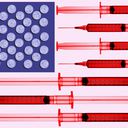Public desire for vaccine increases to 69%, but with partisan divide

69% of the public intends to get a COVID vaccine or already has, up significantly from 60% in November, according to a report out Friday from the Pew Research Center.
Yes, but: The issue has become even more partisan, with 56% of Republicans who say they want or have already received a coronavirus vaccine compared to 83% of Democrats.
Why it matters: High rates of vaccine hesitancy among any group threatens collective progress against the pandemic, meaning that it's just as important to reach white Republicans as it is to reach other hesitant groups.
- The overall 30% who are disinclined to get a COVID vaccine cited concerns such as side effects, a sense the vaccine was rushed and a desire to know more on how the vaccines work.
- The U.S. racial divide in vaccine intent has shrunk overall since November. 61% of Black Americans now say they plan to get a COVID-19 vaccine or have already received one, up sharply from 42% in November.
The big picture: The public continues to be dissatisfied in how top health and state officials have responded to the pandemic, the report says. But people are more optimistic than ever, however, that President Biden's policies and vaccination efforts will effectively contain the outbreak.
- 81% continue to view the pandemic as a major threat to the economy, and a growing 77% think vaccinations will benefit the U.S. economy.
- Support for additional restrictions on public activity has declined — 27% say there should be more restrictions on public activity in their area, down from 44% in November. 41% now say the number of restrictions in their area should stay about the same.
- 85% of Americans see requirements to wear face masks for travelers as necessary, but far fewer say the same about limiting restaurants to take-out service or closing K-12 schools to in-person learning.
Methodology: The report was based on a survey of 10,121 U.S. adults conducted online between Feb. 16-21. The margin of error for the full sample is plus or minus 1.6 percentage points.
Go deeper: Republicans are least likely to want the coronavirus vaccine